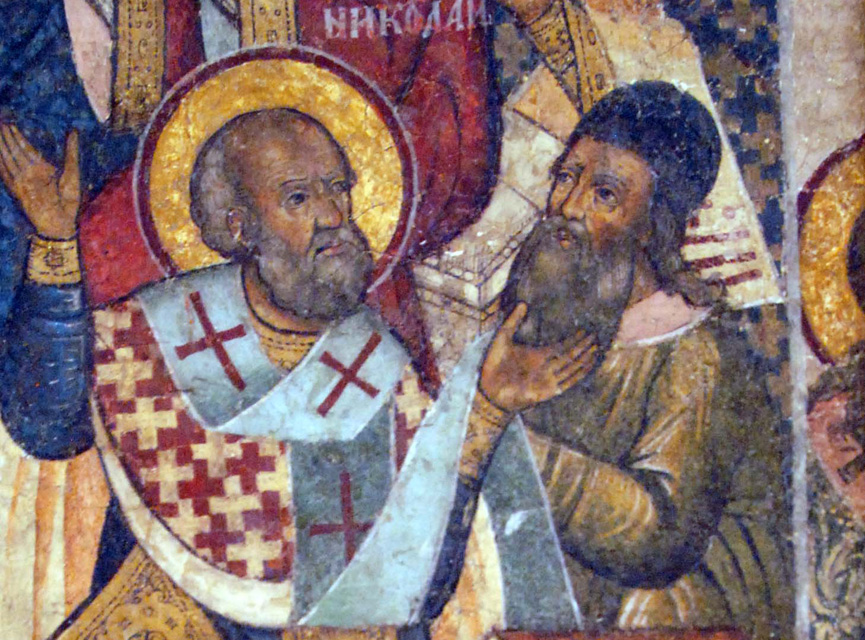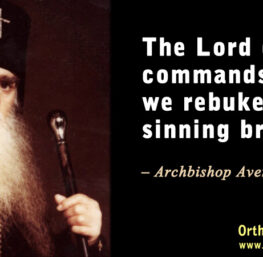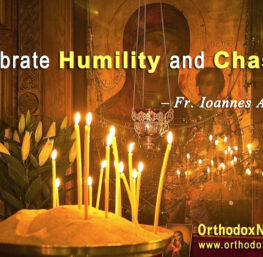 by St. John Chrysostom –
by St. John Chrysostom –
But since our discourse has now turned to the subject of blasphemy, I desire to ask one favor of you all, in return for this my address, and speaking with you; which is, that you will correct on my behalf the blasphemers of this city. And should you hear any one in the public thoroughfare, or in the midst of the forum, blaspheming God; go up to him and rebuke him; and should it be necessary to inflict blows, spare not to do so.
Smite him on the face; strike his mouth; sanctify your hand with the blow, and if any should accuse you, and drag you to the place of justice, follow them there; and when the judge on the bench calls you to account, say boldly that the man blasphemed the King of angels!
For if it be necessary to punish those who blaspheme an earthly king, much more so those who insult God. It is a common crime, a public injury; and it is lawful for every one who is willing, to bring forward an accusation. Let the Jews and Greeks learn, that the Christians are the saviours of the city; that they are its guardians, its patrons, and its teachers.
Christians are the saviours of the city; that they are its guardians, its patrons, and its teachers
Let the dissolute [immoral] and the perverse also learn this; that they must fear the servants of God too; that if at any time they are inclined to utter such a thing, they may look round every way at each other, and tremble even at their own shadows, anxious lest perchance a Christian, having heard what they said, should spring upon them and sharply chastise them.
Have you not heard what John did? He saw a man that was a tyrant overthrowing the laws of marriage; and with boldness, he proclaimed in the midst of the forum, It is not lawful for you to have your brother Philip’s wife.
Mark 6:18 But I urge you on, not against a prince or a judge; nor against the marriage ordinance outraged; nor in behalf of fellow-servants insulted. But I require you to castigate an equal, for insolence against the Lord.
Truly, if I had said to you, punish and correct those kings or judges who transgress the laws, would you not say that I was mad? But John forsooth [indeed] acted thus. So that even this is not too much for us. Now then, at least, correct a fellow-servant; an equal; and although it should be necessary to die, do not shrink from chastising a brother. This is your martyrdom, since John was also a martyr. And although he was not commanded to sacrifice, nor to worship an idol, yet for the sacred laws that were despised, he laid down his head.
Let the dissolute and the perverse also learn this; that they must fear the servants of God too.
Do thou too then contend, even to the death, for the truth, and God will fight for you! And make me not this cold reply. What matters it to me? I have nothing in common with him.
With the devil alone we have nothing in common, but with all men we have many things in common; for they partake of the same nature with us; they inhabit the same earth, and they are nourished with the same food; they have the same Lord; they have received the same laws, and are invited to the same blessings with ourselves.
Let us not say then, that we have nothing in common with them; for this is a satanic speech; a diabolical inhumanity. Therefore let us not give utterance to such words, but exhibit such a tender care as becomes brethren!
___________________________
Excerpts from Homily 1 on the Statues by Saint John Chrysostom. (More modern synonyms included in brackets where appropriate, for clarity.)





The Holy Fathers of the Church were no shrinking violets or cowardly hirelings. They were bold and fearless in proclaiming the truth, defending Christianity, and taking a public stand in challenging those who blasphemed Christ and lead others astray. These were real shepherds and faithful Christian men!
But wasn’t St. Nicholas deposed for striking even Arius, first in place among heretics? He was only returned to the priesthood when the saints intervened on his behalf — but the fact that the other several hundred Fathers saw fit to depose him for a slap on the face of such a heretic seems to me to indicate that this passage may reflect, not the consensus of the Fathers, but the zeal of St. Chrysostom, who cannot in himself be taken accurate in all things (just as we do not consider it any negative point to read St. Clement speak of a phoenix as a real bird — for this is simply what he would have learned as a fact, in his time — nor the poverty St. John of Kronstadt imposed on his wife, beyond what she could bear — even his bishop had to intervene! — nor any other saint’s peculiarities).
We are Orthodox, and so we need not have recourse to a single saint or prophet, but rather we have countless! And it seems they speak as a choir against such bodily correction, except in cases of authority, as parents, perhaps, or monastic brothers.
What do you make of this?
Yes, St. Nicholas was unjustly deposed. But God revealed to the Fathers that they made a mistake. They then reinstated St. Nicholas.
https://www.orthodox.net/questions/nicholas_1.html
In the evening, several of the holy fathers had a vision. The Saint appeared between the Mother of God, and Jesus Christ. The Lord held the gospel book, and His mother held the omophorion, and each gave to Nicholas these emblems of his rank. In the morning, this vision was reported, and the fathers reinstated the Holy Nicholas with fear and joy, and the impious Arius was put to eternal shame.
“With what songs of hymnody shall we praise the holy hierarch, / the opponent of impiety and champion of piety, / the leader, great ally and teacher, / who putteth to shame all the infamous, / the destroyer of Arius and his minions? / For his sake hath Christ, Who hath great mercy, // cast down the arrogance of the enemy.” (Sticheron of Lord I have cried, from the service to St Nicholas)
https://oca.org/saints/lives/2010/12/06/103484-st-nicholas-the-wonderworker-and-archbishop-of-myra-in-lycia
Saint Nicholas, fired with zeal for the Lord, assailed the heretic Arius with his words, and also struck him upon the face. For this reason, he was deprived of the emblems of his episcopal rank and placed under guard. But several of the holy Fathers had the same vision, seeing the Lord Himself and the Mother of God returning to him the Gospel and omophorion. The Fathers of the Council agreed that the audacity of the saint was pleasing to God, and restored the saint to the office of bishop.
Having returned to his own diocese, the saint brought it peace and blessings, sowing the word of Truth, uprooting heresy, nourishing his flock with sound doctrine, and also providing food for their bodies.
https://www.stnicholasorthodox.org/patronsaint.html
In 325, at the Council of Nicea, St. Nicholas again showed his fiery zeal for the well-being of his spiritual children. When Arius refused to be convinced by the pious teaching of the many holy fathers gathered at that council, St. Nicholas resorted to striking Arius in the face. Thus, our “Santa Claus,” so tender towards children, showed his love for children once again, this time by boldly opposing the snake-like attempt of Arius to lead those children astray.
Some of the clergy at the council were scandalized by Bishop Nicholas’ behavior, and he was temporarily suspended from his duties as bishop and kept in confinement. However, several of the fathers gathered in Nicea had the same vision of both Christ and the Mother of God standing beside St. Nicholas and returning the Gospel book and omophorion (bishop’s vestment) to him. The bishops clearly understood this to indicate that the Lord was pleased with St. Nicholas’ zeal, and accordingly they restored him once again as bishop of Myra.
Do you have any example of a Saint advocating violence against unbelievers, from the last 1000 years? If not, I think this seems like a very particular case, and not one we should take a lesson from. All the Apostles set a very different example of overcoming evil with good, and they did not strike their opponents.
St. Stephen the Great of Romania
https://orthodoxwiki.org/Stephen_the_Great
The holy and right-believing Prince Saint Stephen the Great was ruler of Moldova (in modern-day Romania) from 1457 to 1504. He was a great statesman and military tactician as well as being a devout Orthodox Christian. He was responsible for defending Moldova against the Ottoman invasion, building a church or monastery in thanks to God after each victory.
Perhaps of equal or greater significance to this great saint’s life is that he built many churches and monasteries—one after each of his 47 successful battles against the Ottomans, including many of the most beautiful monuments to Orthodoxy in the entire world. These monasteries still stand today and despite over 500 tumultuous years, including 50 years of Communist persecution of the Faith, they continue to thrive as a home to thousands of monastics.
St. Alexander Nevsky of Russia
https://oca.org/saints/lives/2019/11/23/103377-repose-of-st-alexander-nevsky
The princely tonsure of the lad Alexander (a ceremony of initiation to be soldier) was done in the Savior Transfiguration Cathedral of Pereslavl by Saint Simon, Bishop of Suzdal (May 10), one of the compilers of the Kiev Caves Paterikon (Lives of the Fathers). From this Elder-hierarch, Saint Alexander received his first blessing for military service in the name of God, to defend the Russian Church and the Russian Land.
From his early years Saint Alexander went along on his father’s campaigns. In 1235 he participated in a battle at the River Emajogi (in present-day Estonia), where the forces of Yaroslav totally routed the Germans. In the following year Yaroslav went to Kiev, “settling” his son, Saint Alexander, to rule independently as prince at Novgorod.
St. Lazar of Serbia
https://orthodoxwiki.org/Lazar_of_Serbia
The holy, glorious and right-victorious Great Martyr Lazar, Prince of Serbia was one of the Serbian noblemen who ruled the Serbian empire after the death of Emperor Dušan. St. Lazar fought against the Turkish powers on several occasions in order to protect his people. Finally, he fought the Turkish Emperor Amurat and lost on the Field of Blackbirds [Kosovo Polje] on June 15, 1389. Afterwards he was beheaded.
St. Vartan the Warrior of Armenia
https://orthodoxwiki.org/Vartan_the_Warrior
St. Vartan the Warrior is one of the most famous heroes and saints of the Armenian Orthodox Church, giving his life in the 5th century for the defense of the Orthodox Faith and the Armenian nation against the Sassanian Empire.
St. Nicetas the Goth
https://orthodoxwiki.org/Nikitas_the_Goth
The Holy martyr Nicetas the Goth was a member of the Germanic tribes of the fourth century who early had accepted Christianity and bravely defended the Christian faith against those Goth who remained pagans and hostile to the Gospel. Nicetas, a Gothic soldier, lived in the Danube region at the margins of the Byzantine Empire. Presumably, he received his Greek name on the occasion of his baptism by the Gothic bishop Theophilus, a participant in the First Ecumenical Council. Pagan Goths began to oppose the spread of Christianity, which resulted in internecine strife. Nicetas fought in the Gothic civil war between the pagan Athanaric and the Christian Fritigern.
Christopher, it’s interesting that you asking a question (without citing any sources yourself), and then making a point without even hearing the answer upon which your point hinges.
No, our saints do NOT speak against physically reprimanding someone in the cases of blasphemy.
What you should understand, is that the saints give rules of thumb, but whenever a saint speaks more detailed, they are overriding the rule of thumb. St. John Chrysostom in many of his OWN writings, affirms the necessity of not being harsh toward our brethren, and being gentle.
He is therefore not contradicting himself here, but being more specific about the exception.
When our Lord tell us that good works are lawful on the Sabbath, he is no way “contradicting” the rule of thumb, that works should not be done on the Sabbath, but rather, he is describing the situations which go beyond the rule of thumb. The person without discernment sees “contradiction”, whereas the person with discernment sees the nuance in both, and how the more specific situation warrants a different response.
Therefore, St. John Chrysostom is not contradicting the saints here, nor is he contradicting HIMSELF, but rather, he is stating the obvious exception. If you read the actual text, he explains why.
Since when do we have the teachings of any saint, that has them standing near someone speaking blasphemy, and being entirely passive about it?
Even St. Paisios the Athonite, who is known as a “gentle” saint, smacked a theology student for uttering a blasphemous “thought”. St. Gabriel, Fool for Christ, would also hit people. Our saints were not gentle in the face of unrepentant heresy and blasphemy.
You’ve been presented with the “exact” words of St. John Chrysostom, the Golden Mouth. Your only response is to disagree based off of “zero” sources you’ve provided?
Rather than asking a question on an , and providing absolutely zero sources
As a rule of thumb, we should be gentle with others. However, as Archbishop Averky says: When “where explicit impiety is concerned, we should resort to fire and the sword.
One thing you should
MANY of our saints smacked people for speaking blasphemy. Metropolitan Hierotheos Vlachos tells a story about how St. ]aisio